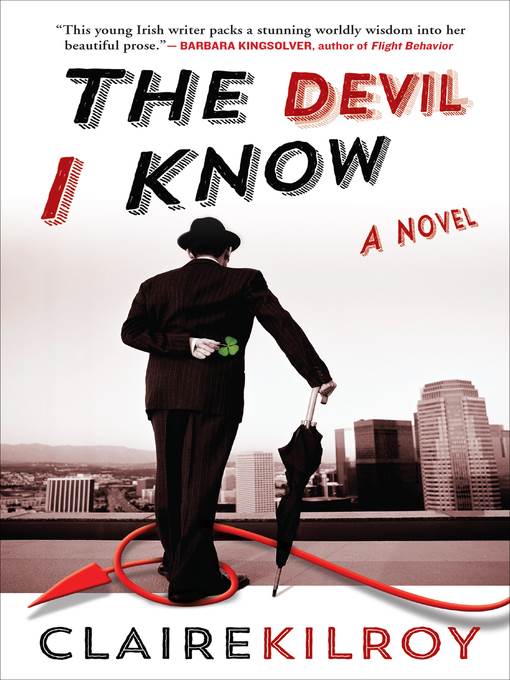
The Devil I Know
A Novel
کتاب های مرتبط
- اطلاعات
- نقد و بررسی
- دیدگاه کاربران
نقد و بررسی

November 4, 2013
Kilroy’s (Tenderwire) darkly comic caper draws the reader in immediately with the introduction of a seductive narrator, Tristram St. Lawrence, who is on trial for financial chicanery. A self-absorbed aristocrat and struggling former alcoholic, Tristram describes his participation in an illegal scheme to take advantage of Ireland’s liberal tax laws during the economic boom of the 1960s. Tristram’s testimony—by turns profane, ironic, and confessional—explores the complex financial swindle devised by his greedy childhood friend, Desmond Hickey, who convinced him to buy property on credit and sell it for a profit. With the encouragement of his mysterious mentor, Monsieur Deauville, the scam rolled along smoothly. The corruption fueled by Dessie’s cheerful amorality and M. Deauville’s coldblooded machinations unreel in Tristram’s suspenseful court testimony, which he provides with the gallows humor of a man who knows his life is about to end. Clues to M. Deauville’s real identity are liberally sprinkled throughout the novel, but so artfully that the final plot twist still comes as a surprise. Both a cautionary tale and a stylish satire, this is a diverting read by a writer who has won numerous awards in her native Ireland.

December 15, 2013
The recent Irish property bubble fuels this story of an ill-fated developer and the mysterious, diabolical figure who supports him. We meet Tristram St. Lawrence, the narrator of Kilroy's fourth novel (Tenderwire, 2006), during a crash landing in his native Dublin, an experience that prompts him to think about drinking again and also reunites him with Hickey, a childhood friend. It's 2006, and Hickey is doing well in the speculative business of residential and hotel developments; rezoning an industrial park for hotel rooms and condos is as easy as paying a "fee" to a minister, and desolate, abandoned farmland can be valuable if you can persuade the same minister to reroute a train line there. Hickey is the stereotypical muscle while Tristram is the brains, with the financial support of a Mr. Deauville (note the name), who is also Tristram's AA sponsor, in contact solely by phone from an unlisted number. Kilroy means to humanize the absurdity of the global boom (and bust) without dwelling too much on its technicalities, which is to the book's credit; Tristram's devilish supporter gives the story a touch of black humor and underscores the way small human foibles can result in multimillion-euro catastrophes. Even so, the book feels constrained, like a black-box play with just a handful of props, partly due to the story's framing as Tristram's court testimony 10 years after the fact. Moreover, Kilroy's tight focus on Tristram, his alcoholism and his efforts to restrain Hickey's greed (an addiction in its own right) make a potentially big story feel small, while some subplots are underdeveloped, particularly one in which Tristram pursues an affair. Kilroy deftly characterizes the absurdity of a land grab, though within a curiously limited range of characters.
COPYRIGHT(2013) Kirkus Reviews, ALL RIGHTS RESERVED.

December 15, 2013
The thirteenth Earl of Howth, Tristram St. Lawrence, a translator of some repute, returns to his ancestral Irish castle home after a long absence only because the plane taking him to a conference in Florida makes an emergency landing in Dublin. Before he knows it, he's swept into a business partnership with an old school chum, developer Desmond Hickey, who's visualizing making it big in the Irish land boom. All along, the skids are greased by shadowy financier M. Deauville, who had first reached out to St. Lawrence after his near-fatal bender and had since served as his AA sponsor. The euphoria of making unimaginable amounts of money culminates in an all-night meeting with Hickey and St. Lawrence and the golden circle of Ireland's money men, making bids on properties in Britain and Shanghai, all financed with debt. And when the bubble bursts, payment must be made. In crisp prose and a cleverly structured narrative, Kilroy (Tenderwire, 2006) casts a sharply satiric eye on international finance gone awry. Smart fiction based on fact.(Reprinted with permission of Booklist, copyright 2013, American Library Association.)

September 1, 2013
Winner of the Rooney Prize for Irish Literature, Kilroy shows us how the Irish bubble burst. Tristram St. Lawrence, the 13th earl of Howth, has been estranged from his family since going on a drunk while his mother lay dying. But he's sober now, under the wing of the shadowy M. Deauville, who thinks the far-reaching development project proposed by Tristram's former schoolmate is just terrific.
Copyright 2013 Library Journal, LLC Used with permission.

January 1, 2014
Over two weeks in March 2016, Tristram St. Lawrence, 13th Earl of Howth and alcoholic in recovery, testifies to a Dublin court about a 2006 Irish housing scam. While Tristram plays a central role in his boom-and-bust tale, his interrogators want information regarding M. Deauville. Heard from but never seen, Deauville is a shadowy figure whose reach extends far into the netherworlds of global financial speculation. He is also Tristram's AA sponsor. As Tristram recounts his personal fall, he also narrates how his country has sold its soul for tainted affluence. The price demanded of such a bargain, he suggests, is too dear. Tristram leaves readers to ponder if it's too late to back out of the deals struck with M. Deauville. VERDICT This fourth novel from Kilroy (Tenderwire) is a seductively sobering and timely morality tale. Tristram's silky yet devastating narration calls to mind voices in works by Martin Amis, Will Self, and especially Nicola Barker's brilliant Darkmans. Here's hoping this novel will garner Ireland's Kilroy the wider U.S. readership her work deserves.--John G. Matthews, Washington State Univ. Libs., Pullman
Copyright 2014 Library Journal, LLC Used with permission.

























دیدگاه کاربران